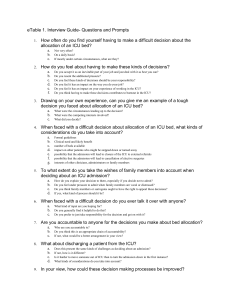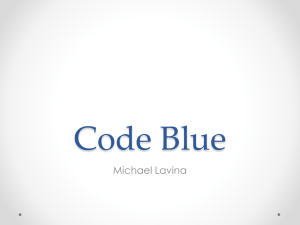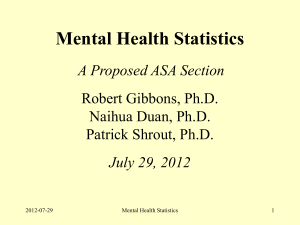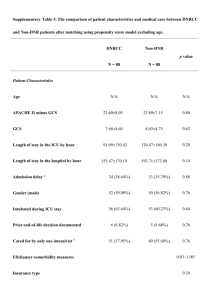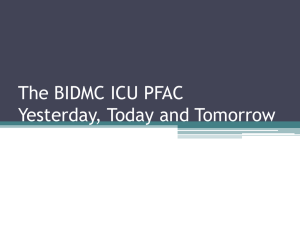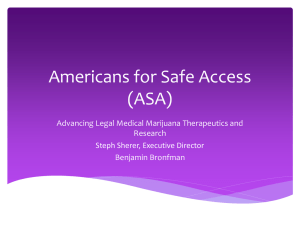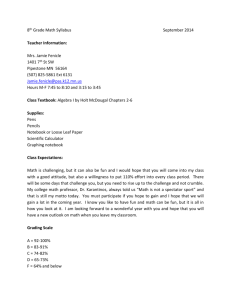Supplemental Digital Content. Summary of critical events requiring
advertisement
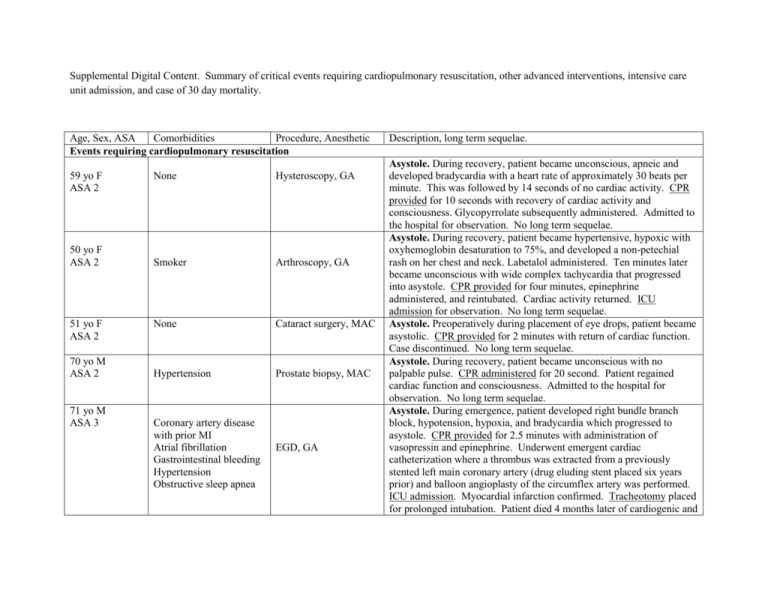
Supplemental Digital Content. Summary of critical events requiring cardiopulmonary resuscitation, other advanced interventions, intensive care unit admission, and case of 30 day mortality. Age, Sex, ASA Comorbidities Procedure, Anesthetic Events requiring cardiopulmonary resuscitation 59 yo F ASA 2 50 yo F ASA 2 51 yo F ASA 2 70 yo M ASA 2 71 yo M ASA 3 None Hysteroscopy, GA Smoker Arthroscopy, GA None Cataract surgery, MAC Hypertension Prostate biopsy, MAC Coronary artery disease with prior MI Atrial fibrillation Gastrointestinal bleeding Hypertension Obstructive sleep apnea EGD, GA Description, long term sequelae. Asystole. During recovery, patient became unconscious, apneic and developed bradycardia with a heart rate of approximately 30 beats per minute. This was followed by 14 seconds of no cardiac activity. CPR provided for 10 seconds with recovery of cardiac activity and consciousness. Glycopyrrolate subsequently administered. Admitted to the hospital for observation. No long term sequelae. Asystole. During recovery, patient became hypertensive, hypoxic with oxyhemoglobin desaturation to 75%, and developed a non-petechial rash on her chest and neck. Labetalol administered. Ten minutes later became unconscious with wide complex tachycardia that progressed into asystole. CPR provided for four minutes, epinephrine administered, and reintubated. Cardiac activity returned. ICU admission for observation. No long term sequelae. Asystole. Preoperatively during placement of eye drops, patient became asystolic. CPR provided for 2 minutes with return of cardiac function. Case discontinued. No long term sequelae. Asystole. During recovery, patient became unconscious with no palpable pulse. CPR administered for 20 second. Patient regained cardiac function and consciousness. Admitted to the hospital for observation. No long term sequelae. Asystole. During emergence, patient developed right bundle branch block, hypotension, hypoxia, and bradycardia which progressed to asystole. CPR provided for 2.5 minutes with administration of vasopressin and epinephrine. Underwent emergent cardiac catheterization where a thrombus was extracted from a previously stented left main coronary artery (drug eluding stent placed six years prior) and balloon angioplasty of the circumflex artery was performed. ICU admission. Myocardial infarction confirmed. Tracheotomy placed for prolonged intubation. Patient died 4 months later of cardiogenic and 70 yo F ASA 2 73 yo M ASA 2 59 yo F ASA 2 Atrial fibrillation Obstructive sleep apnea Hypertension Cystoscopy, GA Hypertension Prostate biopsy, MAC None Breast reduction, GA Events requiring other advanced interventions 34 yo F ASA 1 Laparoscopic None hernioplasty, GA septic shock. Asystole. During the procedure, patient developed bradycardia which progressed to asystole. CPR provided for 60 second, with return of cardiac function. Procedure discontinued. ICU admission for observation. No long term sequelae. Asystole. During anesthetic induction attempts to place LMA were unsuccessful. Succinylcholine administered followed by bradycardia which progressed to asystole. CPR provided for 90 seconds, and epinephrine and atropine administered with recovery of cardiac function. Airway secured. ICU admission for observation. No long term sequelae. Bradycardia. During emergence patient was administered 1 mg neostigmine and 0.2 mg glycopyrrolate. During transfer to recovery patient developed hypoxia and bradycardia. CPR provided for 2 minutes, and glycopyrrolate and atropine administered with recovery of cardiac function. Naloxone administered for continued decreased level of consciousness. ICU admission for observation. No long term sequelae. Pneumothorax. During wound closure patient’s lungs abruptly became difficult to ventilate with associated hypoxia. A pneumothorax was diagnosed and a chest tube placed with immediate improvement in pulmonary mechanics. Admitted to the hospital. Complete recovery Events requiring ICU observation but not cardiopulmonary resuscitation or other advanced techniques 73 yo M Cardiac ablation (PSVT) Cystoscopy, GA Bradycardia. During anesthetic recovery, patient became somnolent ASA 3 Diabetes Mellitus and bradycardia. Glycopyrrolate administered with resolution. ICU Hypertension admission for observation. No long term sequelae. Seizure. Following the procedure, patient had a generalized seizure requiring bag-mask ventilation to treat hypoxemia. Propofol and 19 yo F Muscle spams Muscle biopsy, MAC midazolam administered. The patient desaturated to the 80’s and an ASA 2 oral airway and nasal trumpet were inserted enable ventilation. The patient was successfully mask ventilated until her oxyhemoglobin saturations became normal. ICU admission for observation. No long term sequelae. 55 yo F Liver transplant (10 days ERCP, MAC Seizure. Prior to induction of anesthesia, patient had a generalized ASA 3 prior) tonic-clonic seizure. Lorazepam and fosphenytoin administered. ICU 75 yo M ASA 3 40 yo F ASA 2 Delirium Coronary artery disease COPD Diabetes Mellitus Obstructive sleep apnea Peripheral arterial disease Stroke Hypertension Contrast allergy Events followed by 30 day mortality 62 yo M CLL ASA 4 GVHD Renal failure Cystoscopy, GA Fluoroscopically guided spine injection, MAC Transjugular hepatic biopsy, placement tunneled dialysis catheter, MAC admission for observation. No long term sequelae. Aspiration. During maintenance with LMA patient had emesis. LMA removed and endotracheal tube placed. ICU admission for observation. Developed pneumonia, successfully treated with antibiotics. No long term sequelae. Allergic Reaction. Under allergologist direction, she was premedicated with steroids, histamine 1 and 2 antagonists, montelukast, and albuterol and ipratropium nebulizer. During recovery developed dyspnea, and stridor. Administered intravenous epinephrine, diphenhydramine and steroids. ICU admission for observation. No long term sequelae. Agitation/Restlessness. During the procedure, patient became agitated. Midazolam administered and arm restraints placed. Transferred back to hospital after procedure. Died 8 days later from disease progression. Abbreviations: ASA = American Society of Anesthesiologists; F = female; M = male; yo = years old; MI = myocardial infarction; COPD = chronic obstructive pulmonary disease; PSVT = paroxysmal supraventricular tachycardia; CLL = chronic lymphocytic leukemia; GVHD = graft versus host disease; EGD = esophagogastroduodenoscopy; ERCP = endoscopic retrograde cholangiopancreatography; CPR = cardiopulmonary resuscitation; ICU = intensive care unit; LMA = laryngeal mask airway; GA = General anesthesia; MAC = monitored anesthesia care.
